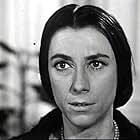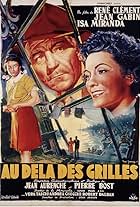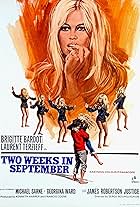IMDb RATING
7.8/10
5K
YOUR RATING
Story of a lonely young girl who is befriended by an innocent but emotionally disabled veteran of the French Indochina War.Story of a lonely young girl who is befriended by an innocent but emotionally disabled veteran of the French Indochina War.Story of a lonely young girl who is befriended by an innocent but emotionally disabled veteran of the French Indochina War.
- Won 1 Oscar
- 5 wins & 2 nominations total
Malka Ribowska
- La voyante
- (as Malka Ribovska)
Featured reviews
I loved this movie so much that my husband and I held our small wedding lunch at the Cabassud restaurant in Ville d'Avray, on one of the two lakes painted so often by Corot and featured prominently in the film. Several years later, when my daughter married, we held a much grander wedding party for her in the same place, attended by many members of the French film colony. It happened to be the evening of the annual Ville d'Avray festival, and quite unexpectedly a procession of people carrying torches appeared out of the night to march around the lake. The wedding was as magical as the film that inspired it. Sadly, I think the film has been mostly forgotten in the United States, but one that can inspire so much romance should be revisited.
---is what many an adult woman might call the result when a man she loves develops a romantic entanglement with what we call a child (in any case, as in this one, a little girl). Generally presumed to be sexual on its face, such a relationship seldom involves actual sex, but always an emotional intensity which is often, even commonly lacking from the carnal attractions of a man and woman. It is this the grown woman cannot engender, thus she envies the little girl who can. Ironically, the younger female is jealous of the older woman's capacity to possess the man sexually, and has little need nor understanding of the more complex feelings the man might have for her. Needful of both, the man usually ends up with neither, as the battle of the sexes AND the dictates of society practically foreordain.
So it is with Hardy Kruger and Patricia Gozzi, star (actually railroad station)-crossed lovers in Sundays and Cybele. Kruger served as a fighter pilot in the French air force in Indo China (Vietnam), and was wounded and traumatized in a crash in which a little Asian girl was killed. Gozzi as we meet her is being dumped in an orphanage in a Paris suburb by her harried father, who tells her it's only temporary but actually plans to abandon her, a fact which Kruger learns from eavesdropping and a letter. He follows father and daughter to the orphanage from the train station, a regular hangout of his, and notes that the father hurries off before a nun answers the door. Later he goes back, poses as the father to get the girl out on Sunday afternoons, for outings in the local area and, though it is winter and most uninviting a venue in which to form a friendship, in a park. The girl, desperately lonely, goes along with the deception, senses wound and need in the Kruger character matching her own, and they form a strongly symbolic and generally childish friendship.
Alas, Kruger lives with a girlfriend, a nurse, and she is a knockout who knows his history and has taken it upon herself to restore the man she loves to health. Alack, it's no use. Kruger retreats from her, steadily and completely, to his fantasy relationship with the child. He is troubled by dreams and flashbacks, and noises set him off. He begins to frighten the child on the Sunday outings as she divines the extent of his mental problems, so she decides they should be "married." Others in the park and on the street pick up on the liaison, and assume the worst, which sets off a chain of events that turn the "wedding ceremony" into a tragedy.
Sundays and Cybele is one of a long line of international movies that misses the boat in depicting adult/child romantic attachments, tailoring the plot elements to conform with popular notions of both the adult and the child which are at best misguided, and at worst, as in this case, a guarantee of unpleasantness and tragedy. The adult in these films, from Peter Lorre in 'M' to the chimney sweep in Emma's Shadow to the Ian Holm portrayal of Lewis Carroll in Dreamchild to Louis Gossett Jr. in Sudie & Simpson, must either be severely neurotic, a social or racial outcast, mentally retarded or outright psychotic. The child must be unloved and neglected, because how else (or why) could the adult manage to seduce or coerce the child into a relationship? "Just another love story" these tales might really be, but we have a deep need to see them as aberrations distinctly outside the pale, needful of retribution, punishments of both adult and child and, as happened to the Kruger character, needful of being put to death to insure the end of the relationship (or, as happened to Dirk Bogarde in Death In Venice, struck dead by the force of his own perversion and lustful iniquity).
So Sundays and Cybele conforms, and it is to the credit of all concerned in the filming, particularly the 12-year-old Patricia Gozzi and director Serge Bourguignon, that it rises above its imposed cliches and attains the status of something like a bleakly beautiful cinematic experience.
So it is with Hardy Kruger and Patricia Gozzi, star (actually railroad station)-crossed lovers in Sundays and Cybele. Kruger served as a fighter pilot in the French air force in Indo China (Vietnam), and was wounded and traumatized in a crash in which a little Asian girl was killed. Gozzi as we meet her is being dumped in an orphanage in a Paris suburb by her harried father, who tells her it's only temporary but actually plans to abandon her, a fact which Kruger learns from eavesdropping and a letter. He follows father and daughter to the orphanage from the train station, a regular hangout of his, and notes that the father hurries off before a nun answers the door. Later he goes back, poses as the father to get the girl out on Sunday afternoons, for outings in the local area and, though it is winter and most uninviting a venue in which to form a friendship, in a park. The girl, desperately lonely, goes along with the deception, senses wound and need in the Kruger character matching her own, and they form a strongly symbolic and generally childish friendship.
Alas, Kruger lives with a girlfriend, a nurse, and she is a knockout who knows his history and has taken it upon herself to restore the man she loves to health. Alack, it's no use. Kruger retreats from her, steadily and completely, to his fantasy relationship with the child. He is troubled by dreams and flashbacks, and noises set him off. He begins to frighten the child on the Sunday outings as she divines the extent of his mental problems, so she decides they should be "married." Others in the park and on the street pick up on the liaison, and assume the worst, which sets off a chain of events that turn the "wedding ceremony" into a tragedy.
Sundays and Cybele is one of a long line of international movies that misses the boat in depicting adult/child romantic attachments, tailoring the plot elements to conform with popular notions of both the adult and the child which are at best misguided, and at worst, as in this case, a guarantee of unpleasantness and tragedy. The adult in these films, from Peter Lorre in 'M' to the chimney sweep in Emma's Shadow to the Ian Holm portrayal of Lewis Carroll in Dreamchild to Louis Gossett Jr. in Sudie & Simpson, must either be severely neurotic, a social or racial outcast, mentally retarded or outright psychotic. The child must be unloved and neglected, because how else (or why) could the adult manage to seduce or coerce the child into a relationship? "Just another love story" these tales might really be, but we have a deep need to see them as aberrations distinctly outside the pale, needful of retribution, punishments of both adult and child and, as happened to the Kruger character, needful of being put to death to insure the end of the relationship (or, as happened to Dirk Bogarde in Death In Venice, struck dead by the force of his own perversion and lustful iniquity).
So Sundays and Cybele conforms, and it is to the credit of all concerned in the filming, particularly the 12-year-old Patricia Gozzi and director Serge Bourguignon, that it rises above its imposed cliches and attains the status of something like a bleakly beautiful cinematic experience.
10dean1685
Forty-five years after this movie was made, it remains the most affecting movie I have ever seen. Story, script, acting, cinematography, music -- all are sublime. I keep praying this film will be released on DVD so that more people can experience its beauty and power. Hardy Kruger, playing a traumatized war veteran, and Patricia Gozzi, playing a preternaturally sensitive abandoned child, create unique and unforgettable characters. All the supporting players are perfectly true. Sundays and Cybele is unconventional enough to put off some viewers, but for those looking for poetry, mystery and magic woven with exquisite subtlety, this film is not to be missed.
One of the most beautiful cinematic statements against human small-minded prejudiced brutality. Beautifully shot in very crisp black and white. The imagery will definitely remain lodged in viewer's head for ever. It's a triumph of loving kindness and friendship over prejudice and hatred that indeed know no borders and are more or less alike anywhere on this planet. Sad News From A Strange Planet? I can't remember exactly but that was the title of a chillingly brilliant Herman Hesse story. It stems from the same universal human wound: the sadness of what we do and very frequently are as opposed to what we should and could have been in our starry essence.
The France was never more melancholy, never more beautiful. I mourn her loss and I mourn the loss of films that would evoke as much humane and poetic feeling.
The France was never more melancholy, never more beautiful. I mourn her loss and I mourn the loss of films that would evoke as much humane and poetic feeling.
A beautiful film, in terms of both images and story. This very sweet - but never sticky -and slightly disturbing story of a platonic 'love affair' between a psychologically damaged, almost child-like ex-soldier and an emotionally abandoned 12 year old girl is deeply moving, honest, and just creepy enough in terms of in nascent sexuality hovering around the edges of the relationship to keep us from feeling too at ease. Shot in gorgeous black and white, with great use of shadows and silhouette, the images are both beautiful and mysterious -- as is the film's central relationship.
Hardy Kruger is excellent as the amnesiac soldier who has the feeling he's done something awful, but doesn't know what, or how to atone for it (we know more, having seen a dream- like flashback of his war experiences to open the film). He is lovable and sad, but we sense there's always a danger this man could lose control and cause damage without meaning to. And Patricia Gozzi is remarkable as the young girl, bringing an almost frightening amount of pain to this hurt character, and never feeling like a kid faking it for a film. There's a complex honesty to her performance combining hurt, innocent joy, emotional need, the first flickers of adult sensuality and manipulativeness, and yet a child's open heart that any seasoned actor would envy.
The film does telegraph where its headed more than once, but somehow it doesn't matter very much. It's the humanity of the telling rather than any surprise twist that makes the film work so well. We root for this odd pair to be able to maintain their bond in the face of a grown up world that doesn't understand how much these two damaged souls need each other and is, as one character puts it, afraid of any love that doesn't fit into nice neat categories. Beautifully made and haunting, it won the Oscar for best foreign film in 1962.
Hardy Kruger is excellent as the amnesiac soldier who has the feeling he's done something awful, but doesn't know what, or how to atone for it (we know more, having seen a dream- like flashback of his war experiences to open the film). He is lovable and sad, but we sense there's always a danger this man could lose control and cause damage without meaning to. And Patricia Gozzi is remarkable as the young girl, bringing an almost frightening amount of pain to this hurt character, and never feeling like a kid faking it for a film. There's a complex honesty to her performance combining hurt, innocent joy, emotional need, the first flickers of adult sensuality and manipulativeness, and yet a child's open heart that any seasoned actor would envy.
The film does telegraph where its headed more than once, but somehow it doesn't matter very much. It's the humanity of the telling rather than any surprise twist that makes the film work so well. We root for this odd pair to be able to maintain their bond in the face of a grown up world that doesn't understand how much these two damaged souls need each other and is, as one character puts it, afraid of any love that doesn't fit into nice neat categories. Beautifully made and haunting, it won the Oscar for best foreign film in 1962.
Storyline
Did you know
- TriviaWhen Patricia Gozzi weeps at he end of the movie, she really cries, with real tears. She was afraid of the scene several days in advance and the director improvised when he felt that Gozzi was ready for it.
- ConnectionsFeatured in V.I.P.-Schaukel: Episode #5.3 (1975)
- SoundtracksExtracts of Tibetian Music
Vogue Records
- How long is Sundays and Cybèle?Powered by Alexa
Details
- Runtime1 hour 51 minutes
- Color
- Sound mix
- Aspect ratio
- 2.35 : 1
Contribute to this page
Suggest an edit or add missing content

































